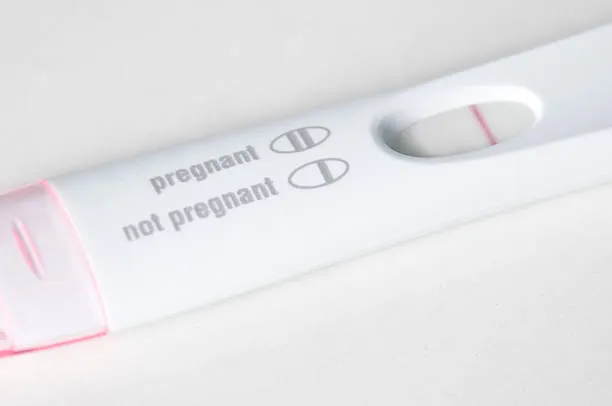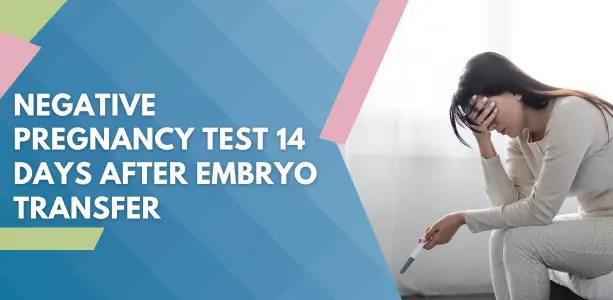The days following an embryo transfer can be an emotional rollercoaster, with patients feeling hopeful and anxious. Many worry about the results, especially if they receive a negative pregnancy test 14 days after embryo transfer. Dr. Mohit Saraogi, one of the Best IVF doctor in Mumbai, explains, “Several factors could contribute to a negative result, and understanding these can help you take the right steps ahead.”
At Saraogi IVF Centre in Mumbai, Dr. Mohit Saraogi and his team of seasoned experts have a deep understanding of the complexities of IVF treatments. By focusing on personalized care and utilizing advanced reproductive technology, the specialists at Saraogi IVF Centre are committed to assisting patients at every stage of their fertility journey.
Worried about your IVF results? Consult with a fertility specialist for expert guidance. Book your appointment today.
Can You Get a Negative Pregnancy Test 14 Days After Embryo Transfer?

It is possible to receive a negative pregnancy test 14 days after embryo transfer, even if conception has occurred. This can be confusing and distressing, but several factors could lead to a negative result:
- Timing of Implantation:
Sometimes, the embryo may implant later than expected, causing a delay in the rise of the pregnancy hormone hCG. This may result in hCG levels being too low to detect on a home pregnancy test.
- Sensitivity of the Pregnancy Test:
Different pregnancy tests have varying sensitivities to hCG levels. If the test isn’t sensitive enough, it may not detect the hormone, leading to a negative result despite implantation.
- Low hCG Levels:
In some pregnancies, hCG levels rise more slowly than usual. It could result in a negative test even though pregnancy has begun.
Implantation timing may be delayed when using frozen embryos, resulting in lower hCG levels detected on a pregnancy test.
- Chemical Pregnancy:
Sometimes, a very early pregnancy loss, known as a chemical pregnancy, can occur. In such cases, hCG levels may drop rapidly, resulting in a negative pregnancy test despite an earlier positive one.
- Human Error:
Errors in the testing process, such as testing too early, using an expired test, or not following instructions properly, can also lead to a false negative result.
- Medications:
Certain medications used during IVF can affect hormone levels, potentially leading to a negative test despite the presence of an early pregnancy.
How Common is a Negative Pregnancy Test After Embryo Transfer?

Getting a negative pregnancy test 14 days after embryo transfer is not uncommon. The success rate of embryo transfer varies depending on factors such as age, fertility issues, and the quality of the embryos. Even under optimal conditions, a significant percentage of transfers may result in a negative test.
Every individual’s fertility journey is unique. Factors like the timing of implantation and variations in hCG production play a crucial role in determining the test’s outcome. Hence, fertility specialists recommend confirming hCG presence through a blood test rather than relying solely on home tests.
Concerned about your pregnancy test results? Speak with an expert to understand your situation better. Book your consultation now.
Still holding onto hope after a negative test? Let’s explore the possibilities.
Can You Still Be Pregnant After a Negative Test 14 Days After Embryo Transfer?

It is possible to test negative for pregnancy even if pregnant 14 days post embryo transfer for various reasons, including:
- Variation in hCG Levels:
Every individual’s hCG production varies. Some women naturally have lower hCG levels, which a home pregnancy test might not pick up at 14 days.
- Laboratory Testing Differences:
Blood tests for hCG are more sensitive and accurate than home pregnancy tests. A negative home test might be followed by a positive blood test, confirming pregnancy.
- Embryo Quality and Development:
The quality and development stage of the embryo can affect implantation timing and hCG production. A slower-developing embryo may initially result in lower hCG levels, which can cause a negative test.
- Test Timing and Accuracy:
Testing at a different time of day or using a different urine sample may yield different results. Morning urine typically has higher hCG concentrations. So, testing at other times may result in a negative test even if pregnant.
- Psychological Stress:
High levels of stress or anxiety can sometimes affect hormone levels. It can potentially impact hCG levels and lead to a negative test result even in early pregnancy.
- External Factors:
Factors such as hydration levels can dilute urine and affect the concentration of hCG, leading to a false negative. Drinking large amounts of fluid before testing may result in a negative test despite pregnancy.
Wondering if your test result is accurate? Get a professional opinion today. Schedule your consultation now.
What are the Next Steps After a Negative Pregnancy Test 14 Days Post-Transfer?

If you receive a negative pregnancy test 14 days after embryo transfer, consider the following steps:
- Consult Your Fertility Specialist:
Contact your fertility specialist to discuss the results. They may recommend a blood test (beta hCG) to confirm the accuracy of the home pregnancy test, as blood tests are more sensitive.
- Repeat the Pregnancy Test:
Your doctor may advise you to repeat the test after a few days. Sometimes, hCG levels rise slowly, and a subsequent test could provide a more accurate result.
- Consider Additional Testing:
If the negative result is confirmed, your doctor might suggest further tests to assess the reasons behind the unsuccessful transfer. These could include uterine evaluations, hormonal assessments, or genetic testing of embryos.
- Emotional Support and Counseling:
Facing a negative result can be difficult. Consider seeking help from a counsellor or joining a support group to process your emotions and plan your next steps.
- Planning Future IVF Cycles:
Discuss with your doctor the possibility of future IVF cycles. Based on the outcomes of this cycle, adjustments can be made to improve the chances of success in subsequent attempts. These may include changing the timing of embryo transfer or altering medication dosages.
- Consider Alternative Fertility Treatments:
If multiple IVF attempts have been unsuccessful, your fertility specialist may discuss alternative treatments, such as using donor eggs or exploring surrogacy options.
Conclusion
Dealing with a negative pregnancy test 14 days after embryo transfer can be a stressful experience, but it doesn’t mark the end of your fertility journey. With the right support and guidance, there are still many paths to explore.
At Saraogi one of the Best IVF Centre in Mumbai, the team led by Dr. Mohit Saraogi, a renowned fertility specialist, offers comprehensive care and advanced treatment options. Their compassionate approach ensures every patient feels supported and empowered, no matter the outcome.
Ready to take the next steps? Consult with a seasoned expert to explore your options. Book an appointment now.
Frequently Asked Questions:
How soon after embryo transfer can you test for pregnancy?
Experts recommend waiting at least 14 days after embryo transfer before testing to allow enough time for hCG levels to build up.
Should I take a blood test if my home pregnancy test is negative?
A blood test can provide a more definitive result and help determine if further action is needed.
What are the chances of a false negative pregnancy test after embryo transfer?
False negatives can occur, especially if testing too early or using a less sensitive test.
What should I do if my pregnancy test shows a faint line?
A faint line could indicate early pregnancy or a very low hCG level. Consult with a specialist for a blood test to confirm.
What if I have a negative test but still have pregnancy symptoms?
If you experience symptoms but have a negative test, consult your fertility specialist for further evaluation and possibly a blood test.

